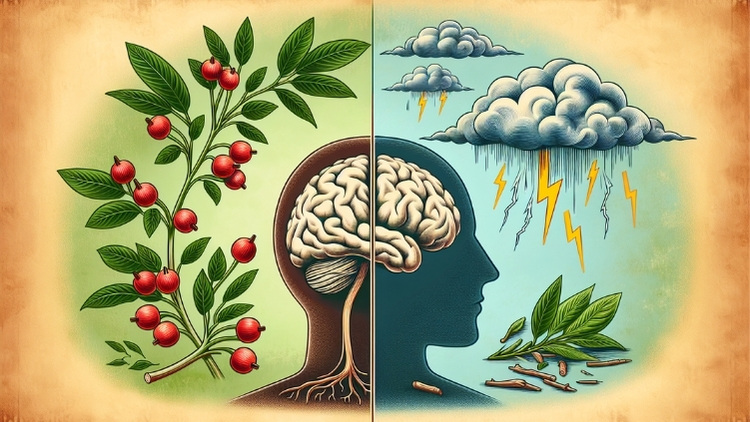
While Ashwagandha is revered for its adaptogenic benefits, enhancing stress resilience and promoting well-being, like any potent botanical, it may have side effects, mainly when consumed in doses exceeding recommended levels or by individuals with specific pre-existing conditions.
The most commonly reported adverse effects include gastrointestinal discomfort, such as nausea and diarrhea, which can be attributed to its phytochemical complexity. Additionally, due to its endocrine-modulating properties, Ashwagandha might influence hormone-sensitive conditions, necessitating caution among those with thyroid disorders or those using thyroid hormone medications.
Its potential to modulate the immune system warrants careful consideration for individuals with autoimmune diseases. Furthermore, combining Ashwagandha with other sedatives could potentiate drowsiness because of its soothing properties.
Two significant studies offer insights into Ashwagandha’s safety profile and potential side effects. The first, featured in the “Journal of Ayurveda and Integrative Medicine,” provides a comprehensive review of Ashwagandha’s safety, highlighting its generally well-tolerated nature but noting instances of gastrointestinal and other mild adverse effects (source). This study emphasizes the importance of dose-dependent reactions and the adaptogen’s broad therapeutic window. Another pivotal study, published in the “Journal of Clinical Psychopharmacology,” investigates Ashwagandha’s effects on stress and cortisol levels, underscoring its efficacy while also acknowledging the necessity for monitoring in specific populations due to its hormonal modulation capabilities (source).
Understanding Ashwagandha and Its Growing Popularity
Ashwagandha (Withania somnifera), a revered herb in Ayurvedic medicine, has surged in popularity as a premier adaptogen for its myriad health benefits, ranging from stress reduction to enhancing vitality. This increase in interest is not only due to its traditional usage but also backed by scientific research that elucidates its adaptogenic properties, neuroprotective effects, immunomodulatory capabilities, endocrine regulation, and antioxidant activity. While Ashwagandha is generally safe for most people, potential side effects such as mild gastrointestinal issues, sedative effects when combined with other depressants, and hormonal modulation, particularly in thyroid function, have been noted, emphasizing the importance of mindful usage.
Diving into the scientific exploration of Ashwagandha and its adaptogenic prowess, two studies offer a broader perspective on its application and efficacy. A study published in “Phytotherapy Research” examines Ashwagandha’s impact on sleep quality and stress, highlighting its significant anxiolytic effects and role in improving sleep patterns, which is critical for overall well-being (source). This research underscores the herb’s potential in addressing insomnia and stress-related disorders, showcasing its broad therapeutic potential beyond mere stress alleviation.
Another compelling study from the “Journal of Ethnopharmacology” focuses on Ashwagandha’s immunomodulatory effects, illustrating how it enhances cell-mediated immunity and protects against stress-induced diseases (source).
This facet of Ashwagandha’s action mechanism reveals its comprehensive impact on human health, positioning it as a critical resource for bolstering immune resilience and combating oxidative stress, further cementing its status as a potent adaptogen.
By offering different vantage points on Ashwagandha’s adaptogenic and health-promoting properties, these studies contribute to a nuanced understanding of how this ancient herb supports physical and mental health in contemporary contexts. By engaging with these scientific insights, enthusiasts and skeptics alike can appreciate the multifaceted benefits of Ashwagandha, recognizing its potential as a natural adjunct to conventional wellness practices. As research continues to evolve, the depth of Ashwagandha’s impact across various physiological domains promises to unlock new avenues for natural health solutions, reinforcing its growing popularity in the global wellness landscape.

Photo by Vita Maksymets on Unsplash
Evaluating the Side Effects: Digestive Discomfort and Allergic Reactions
When considering natural supplements, knowing that even well-tolerated herbs like ashwagandha may have potential adverse effects is crucial. Although relatively uncommon, the negative side effects of ashwagandha should not be overlooked.
Primarily, digestive discomfort can be a concern for some individuals taking ashwagandha. Symptoms might include:
- Nausea
- Stomach upset
- Diarrhea
These issues often arise when ashwagandha is taken on an empty stomach or in higher doses. Moderation and adherence to dosage recommendations can significantly minimize these digestive disturbances.
Furthermore, allergic reactions, albeit rare, can occur. They may present as:
- Itchy skin
- Rash
- Hives
For those with a history of plant allergies, particularly towards plants in the Solanaceae family, caution is advised. You must discontinue use immediately if you experience any signs of an allergic reaction and consult a healthcare provider.
In conclusion, while negative side effects of ashwagandha, like digestive discomfort and allergic reactions, are not the norm, they can happen. Being alert to your body’s responses while trying new supplements is wise, and promptly addressing any unusual symptoms ensures your well-being.
Interactions with Medications and Potential Risks for Certain Individuals

While Ashwagandha is revered for its potential health benefits, awareness of its negative side effects is crucial, particularly regarding drug interactions. Individuals on certain medications should proceed with caution:
- Blood Thinners: Ashwagandha may enhance the effects, increasing the risk of bleeding.
- Thyroid Hormones: It could potentiate thyroid medication, risking hyperthyroidism.
- Blood Pressure Medication: It may lower blood pressure, complicating existing treatments.
Aside from these interactions, certain groups may face higher risks:
- Pregnant Women: Its use is generally discouraged during pregnancy due to potential adverse effects on the fetus.
- Autoimmune Diseases: As an immunomodulator, it might exacerbate symptoms in conditions like rheumatoid arthritis or lupus.
Considering the negative side effects Ashwagandha may have, individuals on medication or those with underlying health conditions need to consult healthcare providers before including it in their regimen. This preemptive step helps to ensure safety and prevent adverse effects.
The Impact of Ashwagandha on Hormonal Balance
Ashwagandha, a renowned adaptogen, has been traditionally used to balance stress hormones and promote well-being. Yet, its effects on hormonal health extend beyond stress relief. While many users experience positive outcomes, Ashwagandha has potential negative side effects to consider, especially concerning hormonal balance. In some cases, Ashwagandha has been reported to:
- Alter thyroid hormone levels, potentially exacerbating thyroid disorders
- Influence cortisol levels, which may disrupt natural stress responses when taken inappropriately
- Affect testosterone and other reproductive hormones, leading to changes in libido and menstrual cycles
These impacts are not universal but highlight the necessity for cautious use, particularly for individuals with pre-existing hormonal conditions. Consistent monitoring and proper guidance from healthcare professionals can help manage and mitigate any negative side effects Ashwagandha might have on hormonal balance, ensuring its benefits are harnessed safely.

Can Ashwagandha Change Your Brain?
By modulating stress pathways, primarily by regulating the hypothalamic-pituitary-adrenal (HPA) axis and mitigating cortisol production, Ashwagandha can counteract the deleterious effects of stress on neural health. This regulation is crucial as chronic stress can impair the synthesis of vital neurotransmitters like serotonin, leading to mood disturbances and cognitive decline, with women particularly vulnerable due to hormonal fluctuations during menstrual cycles.
The study “Effects of Acute Ashwagandha Ingestion on Cognitive Function,” published in the International Journal of Environmental Research and Public Health (source), sheds light on Ashwagandha’s cognitive-enhancing capabilities. This research explores the acute effects of Ashwagandha supplementation on cognitive performance and memory in adults, revealing that even short-term intake can improve cognitive function. Such findings underscore Ashwagandha’s role in neuroenhancement, suggesting its potential to boost brain health and mitigate cognitive decline.
Additionally, another study that delves into the broader spectrum of Ashwagandha’s neuroprotective effects is found in “Phytotherapy Research” (source). This research emphasizes Ashwagandha’s capacity to enhance neuroplasticity—the brain’s ability to form new neural connections—highlighting its therapeutic potential in the prevention and treatment of neurodegenerative diseases and in improving mental health outcomes.
Together, these studies offer a compelling narrative on Ashwagandha’s adaptogenic impact on the brain, presenting it as a powerful natural ally in enhancing cognitive function, fostering emotional stability, and promoting overall neural health.
Best Practices: Dosage Recommendations and Consulting Healthcare Providers
When considering Ashwagandha for its health benefits, it’s crucial to adhere to best practices to minimize the potential for negative side effects of Ashwagandha. Firstly, let’s delve into dosage recommendations:
- Start Low: Begin with a lower dose to assess tolerance.
- Follow Guidelines: Stick to the dosage prescribed on the product label or recommended by a healthcare provider.
- Adjust as Needed: Lowering the dosage or discontinuing use may be necessary if side effects occur.
Additionally, consulting with healthcare providers becomes doubly important for several reasons:
- Medical History Review: They can review your medical history to foresee complications.
- Medication Interference: Healthcare providers can advise if Ashwagandha might interact with current medications.
- Individual Needs: They can tailor the dosage to your specific health needs.
In conclusion, by being cautious and seeking professional advice, you can enjoy the benefits of Ashwagandha while mitigating the risk of negative side effects Ashwagandha.